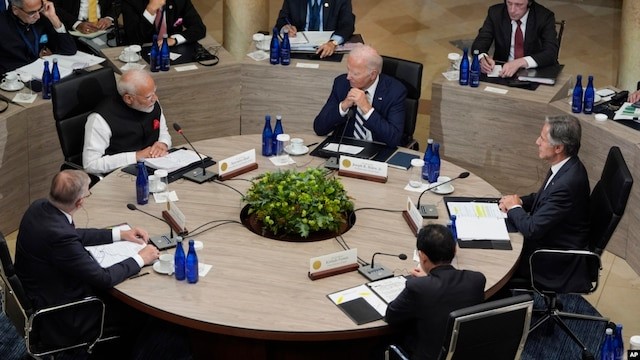The U.S.-led Four Nations Summit 2024, was held on September 21 in Wilmington, Delaware, USA. It was attended by the leaders of the four countries: United States President Joseph Biden Jr., Prime Minister Anthony Albanese, Indian Prime Minister Narendra Modi and Japanese Prime Minister Fumio Kishida.
This was the last “Quartet” summit during the tenure of U.S. President Joe Biden. The summit was held in Biden’s hometown of Wilmington, Delaware, which added a more personal element to the summit: a summit, a gathering of close friends, and a farewell meeting for his term.
So, what’s the point of this summit?
1. The statement is worded more harshly than previous summits
Although the word “China” does not appear in the joint statement of the Wilmington Declaration, the wording of the section on “working together to address regional and global issues” is more aggressive than in previous summit statements.
The statement not only routinely reaffirms “a strong commitment to a free, open, inclusive and resilient Indo-Pacific region,” but also specifically emphasizes “our condemnation of the dangerous use of Coast Guard and Maritime Militia vessels, including their increasingly dangerous operations.” It also said it “continues to be gravely concerned about the militarization of disputed islands and reefs and acts of coercion and intimidation in the South China Sea.”
On the subject of Taiwan, the statement said, “We strongly oppose any subversive or unilateral action that seeks to change the status quo through force or coercion.”
The above harsh words and phrases in the statement are not seen in the previous statements of the four summits.
2. Summit leaks, targeting China
Although U.S. home security adviser Jake Sullivan emphasized to the media before the summit that “China is not a focus of the Quartet’s security dialogue,” the summit’s accidental missteps allowed U.S. President Joe Biden and Secretary of State Anthony Blinken to divulge the summit’s secrets.
After the summit’s opening ceremony, the summit went off the record and Blinken asked all media to leave.
However, forgetting to turn off the microphone during the summit’s closed-door discussion, reporters were surprised to hear, “The first topic we discussed was China.”
Then, reporters heard President Joe Biden on the microphone, who said, “China continues to be aggressive and test the waters across the region, in the South China Sea, the East China Sea, South China, South Asia, and the Taiwan Strait.”
Journalists have seen that what the leaders of the four-nation summit have said in public is not consistent with what the summit has been talking about in private.
In their public remarks, the leaders of the four countries denied that the four-nation summit was directed at China.
On September 21, U.S. Assistant for Home Security Affairs Sullivan said that QUAD has nothing to do with other countries and does not target other countries.
However, the remarks of Blinken and Biden, which were heard from microphones that they forgot to turn off, proved that the main topic of the summit was to target China.
3. The color of military cooperation among the four countries at sea is obvious
The joint statement of the four-nation summit also clarified that the U.S. Coast Guard, the Japan Coast Guard, the Australian Border Guard and the Indian Coast Guard, plan to launch the first quadrilateral maritime vessel patrol mission in 2025 to improve mutual operational capabilities and enhance maritime security. And the mission will be carried out continuously in the Indo-Pacific region in the future.
According to senior U.S. government officials, under the joint coast guard exercise announced by the four nations, a U.S. Coast Guard vessel will take the lead for the first time, with personnel from the Australian, Japanese and Indian coast guards co-located on that vessel, and then the other nations will follow suit in turn.
U.S. officials have previously emphasized that the Quadrilateral Security Dialogue is not a “security” alliance. The goals of the summit are to address climate change, invest in infrastructure, strengthen supply chains, enhance cybersecurity, and add new vaccines.
United States officials have also repeatedly stated: “This is not a military alliance. It is an informal alliance of democracies that are committed to a free and open Indo-Pacific.”
4. More institutionalized organization of the Quadripartite Summit
As tensions continue to rise in the Indo-Pacific region, the 2024 Quad Summit has shown that the Quadrilateral Security Dialogue is gradually becoming an important pillar of the U.S. Indo-Pacific strategy. The Quadrilateral mechanism has been further institutionalized, and the United States, Japan, India and Australia have formed an alliance on the China issue.
In the just-concluded “Quadrilateral Security Dialogue” summit, the United States, Japan, India and Australia in order to counterbalance China, once again made a more resolute and specific strategy, the core mechanism of the United States Indo-Pacific strategy has been further strengthened. A statement released after the summit said, “This organization will support the Indo-Pacific region for decades to come.”
The Wilmington Declaration concluded, “We look forward to the United States hosting the next Quadrilateral Foreign Ministers‘ meeting in 2025 and India hosting the next Quadrilateral Leaders’ Summit in 2025. The Quadrilateral Security Dialogue will continue to live on.”
5. Angering China
On Monday, China reacted angrily to the summit’s apparent targeting of China. Chinese Foreign Ministry spokesman Lin Jian called the Quadrilateral Security Dialogue a U.S. tool that “tries to entangle military security cooperation with sea-related issues.”
On Sept. 23, Chinese Foreign Ministry spokesman Lin Jian said at a regular press conference that cooperation between countries should be conducive to promoting regional peace, stability and prosperity, rather than cobbling together a closed and exclusive small circle that undermines mutual trust and cooperation among regional countries.
Lin Jian said: “China is open to normal sea-related cooperation between the countries concerned, but such cooperation should not be directed against other countries under any guise, and should not undermine regional peace and stability.”
Conclusion:
From everything that has been revealed at this four-nation summit, the core strategy of the four-nation summit is to curb China’s development in the region. The joint patrols by the coast guards of the four countries, which will begin next year, will further enrage China and the situation in the Indo-Pacific region will further deteriorate. This should be an important security risk in the Indo-Pacific region that deserves the attention of the international community.
The Indo-Pacific regional security cooperation mechanism without China’s participation will certainly not effectively solve a series of problems in the region, and will also make the Chinese authorities believe that the four-nation summit is a coalition of organizations that are enemies of China. This will further deepen the conflict between China and the United States, Japan, India and Australia, and ultimately deprive the Quadrilateral Security Dialogue, which aims to maintain security in the Indo-Pacific region, of its true meaning.
Author: David Lee
































